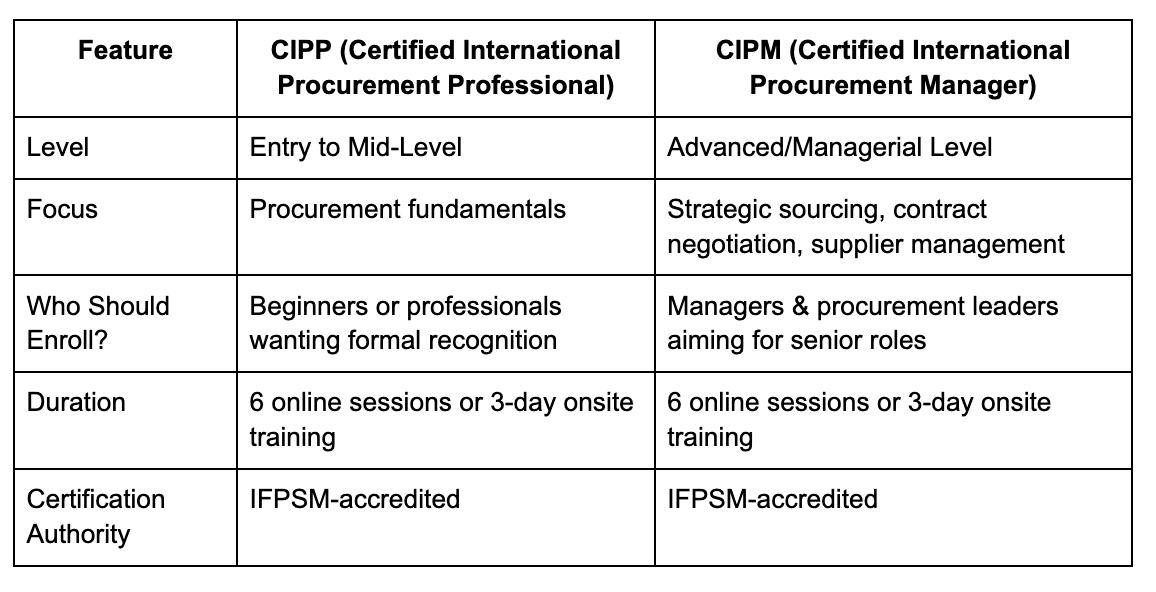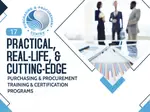How to Get CIPP and CIPM Certification? A Comprehensive Guide for Procurement Professionals
Many professionals ask how to get CIPP certification when looking to gain recognition, secure leadership roles, and improve their skills.
Even experienced procurement specialists may struggle with promotions and supplier negotiations without the right certification.
This guide provides a step-by-step breakdown of the CIPP and CIPM certifications, their benefits, eligibility criteria, course details, and how to successfully earn these credentials.
What are the CIPP and CIPM Certifications?
The CIPP certification is an entry to mid-level procurement qualification, perfect for professionals who want to establish a strong foundation in procurement.
On the other hand, the CIPM certification is designed for procurement managers who seek to advance into leadership roles by mastering strategic sourcing, supplier management, and cost optimization.
Key Differences Between CIPP and CIPM:
Before choosing the right certification, it's important to understand their differences. The following table outlines key distinctions:

How to Get CIPP Certification?
If you are looking to get CIPP certification, follow these steps:
Step 1: Check Eligibility
To enroll in the CIPP program, you must meet one of the following criteria:
Have an Associate’s degree
OR
Possess at least 3 years of experience in procurement or supply chain management
Step 2: Register for the Program
Visit the official certification page to apply.
Step 3: Complete the Training
CIPP training is available in two formats:
- 6 online sessions (1 per week, 4 hours each) OR
- 3-day onsite program
Topics covered in the training program include:
- Procurement principles & sourcing strategies
- Contract management & supplier selection
- Negotiation strategies & risk management
- Commercial contracts & compliance
Step 4: Pass the Certification Exam
Candidates must pass a 3-hour multiple-choice exam to earn their CIPP certification.
How to Get CIPM Certification?
For experienced professionals, here’s how you can get CIPM certification:
Step 1: Check Eligibility
To enroll in CIPM, you must:
- Have 5+ years of experience in procurement OR
- Hold a CIPP certification (exemptions may apply for those with 10+ years of experience)
Step 2: Enroll in the Training
CIPM training is available in two formats:
- 6 online sessions (1 per week, 4 hours each) OR
- 3-day onsite program
Step 3: Master Advanced Procurement Strategies
The CIPM curriculum includes:
- Contract administration & audits
- Cost reduction & managing price increases
- Advanced negotiation techniques
- Category management & supplier relationship management
- Financial analysis & procurement leadership skills
Step 4: Pass the Certification Exam
Candidates must take a 3-hour multiple-choice exam to obtain the CIPM certification.
10 Reasons Why Should You Get CIPP and CIPM Certification
Earning a CIPP or CIPM certification does more than just add a credential to your resume; it provides tangible benefits that can significantly impact your professional growth and opportunities. Here are some of the key advantages:
- Expanded Professional Network – Connect with a global network of procurement professionals, industry leaders, and subject matter experts. Certification holders often gain access to exclusive networking events and communities.
- Enhanced Leadership and Strategic Thinking – The training programs help professionals build leadership skills, allowing them to take on managerial and executive roles within their organizations.
- Higher Earning Potential – Certified professionals typically earn more than their non-certified peers. Many organizations offer salary increments, bonuses, or promotions to employees with recognized certifications.
- Priority in Hiring and Promotions – Employers favor certified candidates when hiring for senior procurement roles. Holding a CIPP or CIPM certification sets you apart from the competition.
- Improved Supplier Negotiation and Management Skills – Gain in-depth knowledge of supplier relationship management, negotiation tactics, and contract structuring, which directly improve procurement efficiencies.
- Stay Updated on Global Standards – Keep up with international procurement regulations, compliance requirements, and industry best practices.
- Access to Exclusive Learning Resources – Participants receive industry-relevant materials, including a 150+ page procurement manual, case studies, and ready-to-use templates to apply in real-world scenarios.
- Stronger Decision-Making Abilities – Certification programs emphasize data-driven procurement strategies, enabling professionals to make informed, strategic purchasing decisions.
- Increased Job Security – Certified professionals are seen as more valuable assets to their organizations, reducing the risk of redundancy or job loss during corporate restructuring.
- Continuous Learning and Professional Development – Certification is just the beginning; many procurement organizations require ongoing learning through workshops, webinars, and advanced training sessions, ensuring continuous professional growth.
Besides career growth and skill enhancement, obtaining CIPP or CIPM certification provides:
- Networking Opportunities: Connect with top procurement professionals globally.
- Leadership Development: Gain the confidence to take on procurement leadership roles.
- Employer Preference: Companies often prioritize certified professionals for senior positions.
- Global Recognition: Be part of an internationally acknowledged certification body.
Check Out: Top 3 Best Procurement Certifications in 2025
Get Certified and Advance Your Procurement Career
Earning a CIPP or CIPM certification is a smart investment for procurement professionals aiming for leadership roles. These certifications provide the skills and credentials needed to stay ahead in the industry.
Learn more about the CIPP or CIPM today and here.
1. How long does it take to complete CIPP and CIPM certification?
1. How long does it take to complete CIPP and CIPM certification?
Both programs take 6 weeks for online training (1 session per week) or 3 days for onsite training.
2. Can I get CIPP certification without prior procurement experience?
2. Can I get CIPP certification without prior procurement experience?
Yes! If you have an Associate’s degree, you qualify even without work experience.
3. What is the passing score for the certification exams?
3. What is the passing score for the certification exams?
Candidates need a minimum score of 70% to pass the multiple-choice exam.
4. Can I complete both CIPP and CIPM certifications together?
4. Can I complete both CIPP and CIPM certifications together?
Yes, but CIPP is a prerequisite for CIPM unless you have extensive procurement experience.
5. Is there a recertification requirement?
5. Is there a recertification requirement?
Yes, professionals must renew their certification periodically by completing continuing education hours or retaking exams.






